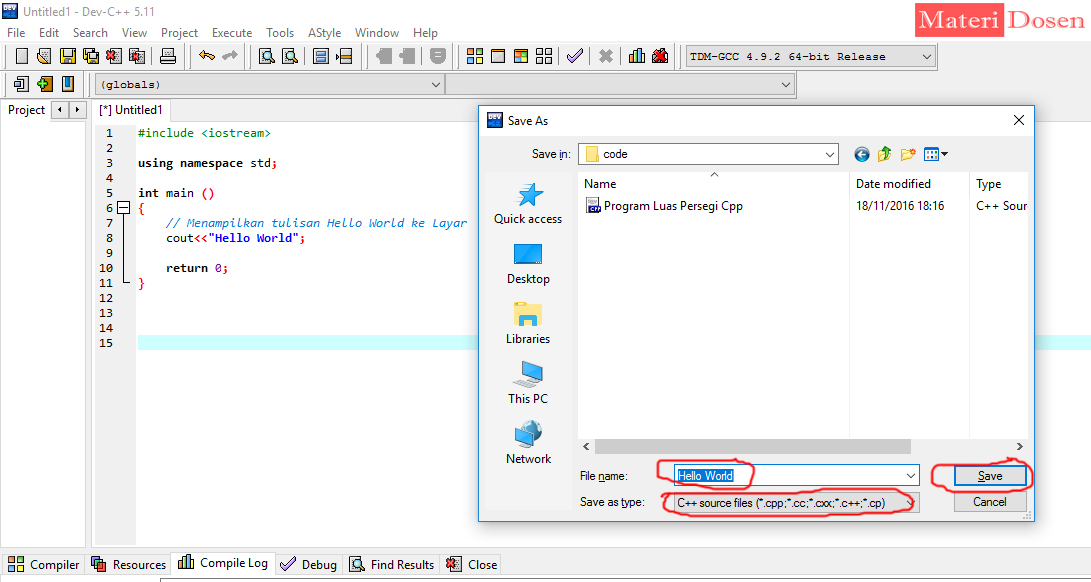- Related Questions & Answers
- Selected Reading
cin, cout, cerr, and clog are streams that handle standard inputs and standard outputs. These are stream objects defined in iostream header file.
std::cin is an object of class istream that represents the standard input stream oriented to narrow characters (of type char). It corresponds to the C stream stdin. The standard input stream is a source of characters determined by the environment. It is generally assumed to be input from an external source, such as the keyboard or a file.
std::cout is an object of class ostream that represents the standard output stream oriented to narrow characters (of type char). It corresponds to the C stream stdout. The standard output stream is the default destination of characters determined by the environment. This destination may be shared with more standard objects (such as cerr or clog).
The object cerr controls output to a stream buffer associated with the object stderr, declared in <cstdio>. It is used for outputting error to the standard output stream.
Note − All the objects declared in this header share a peculiar property - you can assume they are constructed before any static objects you define, in a translation unit that includes <iostream>. Equally, you can assume that these objects are not destroyed before the destructors for any such static objects you define. (The output streams are, however, flushed during program termination.) Therefore, you can safely read from or write to the standard streams before program startup and after program termination.
You can use these stream objects as follows −
Example
Then save this program to hello.cpp file. Finally navigate to the saved location of this file in the terminal/cmd and compile it using −
This question is unlikely to help any future visitors; it is only relevant to a small geographic area, a specific moment in time, or an extraordinarily narrow situation that is not generally applicable to the worldwide audience of the internet. May 27, 2017 The two keywords cout in C and cin in C are used very often for printing outputs and taking inputs respectively. These two are the most basic methods of taking input and printing output in C. To use cin and cout in C one must include the header file iostream in the program. Dev-C Dev-C is a free IDE for Windows that uses either MinGW or TDM-GCC as underlying compiler. Originally released by Bloodshed Software, but abandoned in 2006, it has recently been forked by Orwell, including a choice of more recent compilers.
Run it using −
Output
If you give it the input 15, this will give the output −
| Language | ||||
| Standard Library Headers | ||||
| Freestanding and hosted implementations | ||||
| Named requirements | ||||
| Language support library | ||||
| Concepts library(C++20) | ||||
| Diagnostics library | ||||
| Utilities library | ||||
| Strings library | ||||
| Containers library | ||||
| Iterators library | ||||
| Ranges library(C++20) | ||||
| Algorithms library | ||||
| Numerics library | ||||
| Input/output library | ||||
| Localizations library | ||||
| Regular expressions library(C++11) | ||||
| Atomic operations library(C++11) | ||||
| Thread support library(C++11) | ||||
| Filesystem library(C++17) | ||||
| Technical Specifications |
| I/O manipulators | ||||
| C-style I/O | ||||
| Buffers | ||||
(deprecated in C++98) | ||||
(C++20) | ||||
| Streams | ||||
| Abstractions | ||||
| File I/O | ||||
| String I/O | ||||
| Array I/O | ||||
(deprecated in C++98) | ||||
(deprecated in C++98) | ||||
(deprecated in C++98) | ||||
| Synchronized Output | ||||
(C++20) | ||||
| Types | ||||
| Error category interface | ||||
(C++11) | ||||
(C++11) |
Count Devices In Device Manager
| Member functions | ||||
| Formatting | ||||
| Locales | ||||
| Internal extensible array | ||||
| Miscellaneous | ||||
| Member classes | ||||
| Member types |
streamsize precision()const; | (1) |
| (2) |
Manages the precision (i.e. how many digits are generated) of floating point output performed by std::num_put::do_put.
The default precision, as established by std::basic_ios::init, is 6.
[edit]Parameters
| new_precision | - | new precision setting |
[edit]Return value
the precision before the call to the function
C++ Cout Int
[edit]Example
Cout Dev C Online
Output:

[edit]See also
Cout Dec
| manages field width (public member function)[edit] |
| changes floating-point precision (function)[edit] |